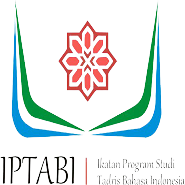Publication Ethics
Publication Ethics
The publication of an article in a peer-reviewed Journal of Education for the Language and Literature of Indonesia (Jelli) is an essential building block in developing a coherent and respected knowledge network. It directly reflects the quality of the authors' work and the institutions that support them. Peer-reviewed articles support and embody the scientific method. It is, therefore, essential to agree upon standards of expected ethical behavior for all parties involved in publishing: the author, the journal editor, the peer reviewer, the publisher, and the society. Tadris Bahasa Indonesia of Faculty of Education and Teacher Training, UIN Sunan Gunung Djati, as the publisher of this journal, takes its duties of guardianship over all stages of publishing exceptionally seriously. We recognize our ethical and other responsibilities. We are committed to ensuring that advertising, reprint, or additional commercial revenue has no impact or influence on editorial decisions.
Publication Decisions
The editor of the Journal of Education for the Language and Literature of Indonesia (Jelli) is responsible for deciding which of the articles submitted to the journal should be published. The validation of the work in question and its importance to researchers and readers must always drive such decisions. The editors may be guided by the policies of the journal's editorial board and constrained by such legal requirements as shall then be in force regarding libel, copyright infringement, and plagiarism. The editors may confer with other reviewers when making this decision.
Fair Play
An editor evaluates manuscripts for their intellectual content at any time without regard to the author's race, gender, sexual orientation, religious belief, ethnic origin, citizenship, or political philosophy. Fair play in the editorial process reflects the journal's commitment to academic integrity, especially within Indonesian language and literature education. Manuscripts are assessed objectively based on their scholarly quality, relevance to the discipline, originality of thought, and contribution to the advancement of language and literature pedagogy. Editorial decisions are made without discrimination, ensuring that factors such as an author's background, institutional affiliation, or ideological stance do not influence their work's fair and rigorous evaluation. This principle upholds an inclusive and merit-based academic environment, fostering diverse perspectives in studying and teaching Indonesian language and literature.
Confidentiality
The editor and any editorial staff must not disclose information about a submitted manuscript to anyone other than the corresponding author, reviewers, potential reviewers, other editorial advisers, and the publisher, as appropriate. Furthermore, unpublished content disclosed in a submitted manuscript must not be used by anyone without the author's consent.
Duties of Authors
Authors must conduct and present accurate, original research on the Indonesian language and its literature. They should discuss their findings objectively and provide enough detail for other scholars to replicate the study. Authors must report all data and results truthfully and avoid plagiarism, including failing to cite or quote others' work properly. They also should not simultaneously submit the same manuscript to multiple journals or include overlapping content from previously published works. To maintain academic integrity in Indonesian language and literature education, they must acknowledge all referenced sources, especially those that significantly shape their research.
Duties of Reviewers
Reviewers uphold the quality and integrity of scholarly publications by offering constructive, honest, and unbiased feedback based on their expertise. They assess the manuscript’s originality, methodology, coherence, and relevance to the journal’s focus. When they identify ethical issues such as plagiarism or data fabrication, they report them and suggest necessary improvements.
Reviewers evaluate manuscripts thoroughly using their academic qualifications and subject-matter knowledge. Editors select reviewers with strong research backgrounds, relevant publications, and up-to-date insight into the field.
Reviewers meet deadlines by completing their evaluations within the journal’s expected timeframe, typically within two to four weeks. If they cannot review a manuscript or lack the proper expertise, they immediately notify the editor so the editorial team can assign another reviewer.
Reviewers also respect confidentiality. They do not share, discuss, or use any part of a manuscript for personal gain before publication. Through these actions, reviewers actively support the advancement of knowledge and uphold the credibility of academic publishing.
Article Publication Charges
Article Submission: 0.00 (IDR)
Authors are "Free of Charge" for the articles that have been accepted. You can waive each fee if you do not have funds to pay such fees. We do not want fees to prevent the publication of worthy work.
Article Publication:
This journal charges the article publication fee for supporting the cost of wide-open access dissemination of research results, managing the various costs associated with handling and editing of the submitted manuscripts, and the Journal management and publication in general, the authors or the author's institution is requested to pay a publication fee for each article accepted. The fee covers:
The standard pages manuscript and layout/editing. DOI registration for each paper.
Checking the article similarity by Turnitin; the final result will be sent to authors (by request).









